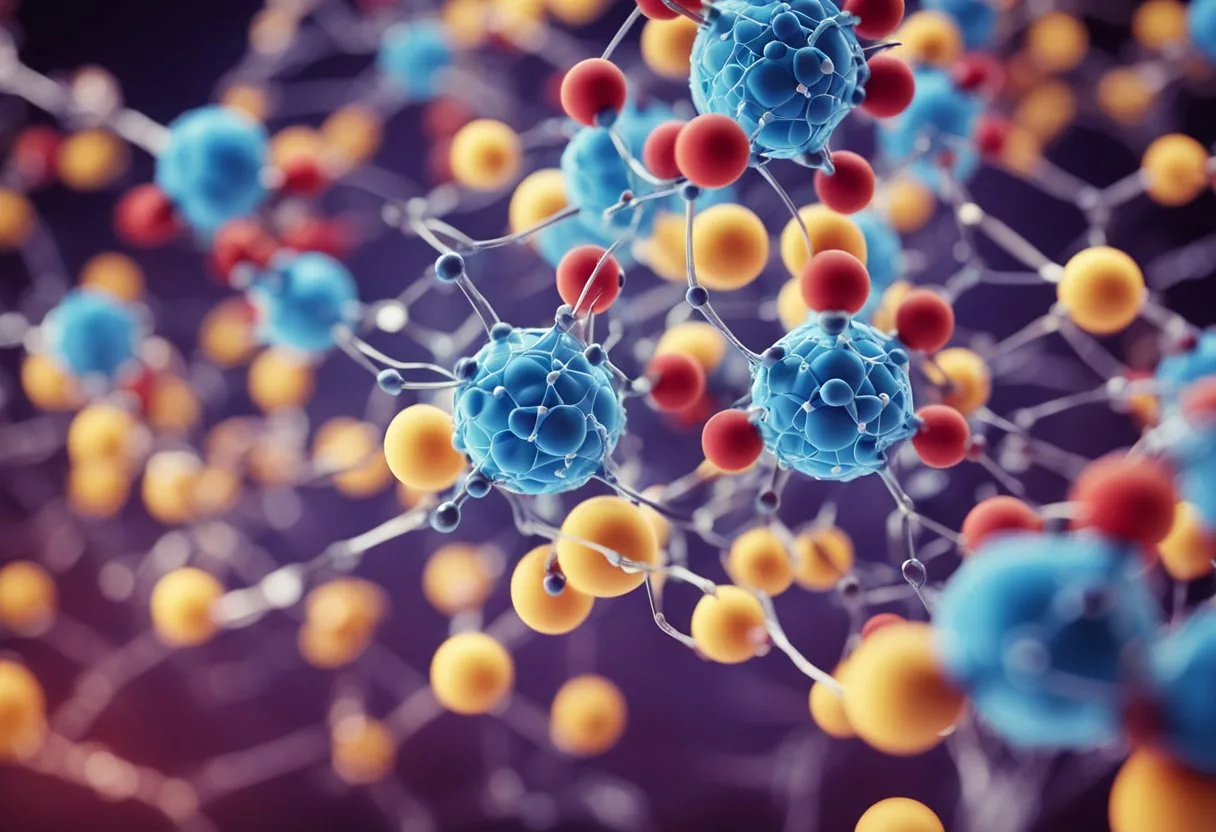Nitric oxide is a vital molecule in the human body. It plays a key role in many bodily functions. Nitric oxide helps widen blood vessels, which boosts blood flow and lowers blood pressure. This effect on the circulatory system is one of its main jobs.

The body makes nitric oxide on its own. It also gets some from food. This gas does more than just help blood move around. It aids in brain function, immune response, and muscle performance. Many people take supplements to try to increase their nitric oxide levels.
Research shows that healthy nitric oxide levels may have several health benefits. These include better exercise performance and heart health. Some studies suggest it might help with erectile dysfunction too. While more research is needed, nitric oxide’s role in the body is clear.
Key Takeaways
- Nitric oxide widens blood vessels and improves blood flow
- The body produces nitric oxide and also gets it from certain foods
- Healthy nitric oxide levels may offer benefits for exercise and heart health
Fundamentals of Nitric Oxide

Nitric oxide is a tiny gas molecule that plays a big role in the human body. It acts as a messenger, telling blood vessels to relax and widen.
This widening of blood vessels is called vasodilation. When blood vessels open up, more blood can flow through them. This helps oxygen and nutrients get to cells all over the body.
The body makes nitric oxide in a few ways. One way is by using an amino acid called l-arginine. Special enzymes turn l-arginine into nitric oxide.
Another way the body makes nitric oxide is from certain foods. Green leafy veggies and some root vegetables contain substances that can be turned into nitric oxide.
There are different types of enzymes that make nitric oxide in the body. Two important ones are:
- eNOS (endothelial nitric oxide synthase)
- iNOS (inducible nitric oxide synthase)
These enzymes work in different parts of the body to produce nitric oxide when it’s needed.
Nitric oxide doesn’t last long in the body. It breaks down quickly after it’s made. This means the body needs to keep making more to keep blood vessels open.
Physiological Roles of Nitric Oxide

Nitric oxide plays crucial roles in the body. It affects blood flow, exercise ability, and sexual function. Let’s explore how this small molecule impacts these key areas.
Cardiovascular Effects
Nitric oxide is vital for heart and blood vessel health. It helps blood vessels relax and widen, a process called vasodilation. This lowers blood pressure and improves blood flow.
For people with high blood pressure, more nitric oxide can help. It eases the strain on artery walls. This may lower the risk of heart attacks.
Nitric oxide also stops blood cells from clumping together. This keeps blood flowing smoothly. It may help prevent dangerous clots from forming.
Influence on Exercise and Athletic Performance
Athletes and fitness fans often seek ways to boost nitric oxide. It can enhance exercise performance in several ways.
Nitric oxide widens blood vessels during physical activity. This lets more oxygen-rich blood reach hard-working muscles. The result? Better endurance and less fatigue.
It also helps muscles use oxygen more efficiently. This can lead to:
- Faster recovery after workouts
- Improved power output
- Better overall athletic performance
Some athletes eat foods high in nitrates to naturally boost nitric oxide levels.
Impact on Sexual Health
Nitric oxide plays a key role in sexual function, especially for men. It helps control blood flow to the penis.
When aroused, the body releases nitric oxide. This causes the blood vessels in the penis to relax and expand. More blood flows in, leading to an erection.
Low nitric oxide levels can cause erectile dysfunction. That’s why drugs like Viagra work by increasing nitric oxide effects. They help improve blood flow and maintain erections.
For both men and women, good nitric oxide levels support overall sexual health. It can enhance arousal and sexual response by improving blood flow to the genitals.
Nitric Oxide and Disease Prevention

Nitric oxide plays a key role in protecting the body against certain diseases. It helps keep the heart and blood vessels healthy. It also aids in managing blood sugar levels.
Contribution to Heart Disease Reduction
Nitric oxide helps prevent heart disease in several ways. It relaxes and widens blood vessels, which improves blood flow. This can lower blood pressure and reduce strain on the heart.
Nitric oxide also helps stop arterial plaque from forming. Plaque buildup in arteries can lead to heart attacks and strokes. By keeping arteries clear, nitric oxide protects the heart.
This molecule may also help lower cholesterol levels. High cholesterol is a major risk factor for heart disease. Nitric oxide might help the body remove excess cholesterol from the bloodstream.
Roles in Diabetes Management
Nitric oxide plays a part in managing diabetes. It helps control blood glucose levels by improving how the body uses insulin.
Insulin is a hormone that helps cells take in glucose from the blood. Nitric oxide makes cells more sensitive to insulin. This means the body can use insulin more effectively.
For people with diabetes, this can lead to better blood sugar control. It may help reduce the risk of diabetes-related complications. These can include problems with the heart, kidneys, and nerves.
Nitric oxide also improves blood flow. This is important for people with diabetes, who often have poor circulation. Better blood flow can help prevent diabetic foot ulcers and other issues.
Sources of Nitric Oxide

The body can get nitric oxide from food and supplements. Some foods have nitrates that turn into nitric oxide. Supplements can also boost nitric oxide levels.
Natural Dietary Sources
Many foods contain nitrates that the body changes into nitric oxide. Leafy greens like spinach, kale, and arugula are top sources. Beets are also very high in nitrates. Other good sources include celery, lettuce, and carrots.
Fruits can help too. Watermelon has an amino acid called citrulline that boosts nitric oxide. Pomegranates are another fruit that may increase nitric oxide levels.
Nuts and seeds provide arginine, which the body uses to make nitric oxide. Walnuts, almonds, and pumpkin seeds are good choices.
Supplementation and Dosage
Some people take supplements to raise nitric oxide. Common ones include L-arginine and L-citrulline. These amino acids help the body produce more nitric oxide.
Dosages vary based on the supplement. For L-arginine, 3-6 grams per day is typical. L-citrulline doses are often 3-6 grams daily. Beetroot powder is another option, with doses around 250-500 mg per day.
It’s best to talk to a doctor before starting any supplement. They can advise on the right type and amount for your needs. Some people may need to avoid nitric oxide boosters.
Safety and Side Effects

Nitric oxide supplements may cause some unwanted effects. People with certain health conditions need to be extra careful when using them.
Potential Risks
Nitric oxide supplements can lead to stomach problems. Some people get diarrhea, stomach pain, or bloating. Headaches and dizziness are also common.
Low blood pressure is another risk. This can make people feel weak or faint. In rare cases, severe allergic reactions can happen.
Heartburn is a problem for some users. The supplements might worsen acid reflux.
Considerations for Specific Groups
Pregnant women should be careful with nitric oxide supplements. They might raise blood pressure, which can be risky during pregnancy.
People with kidney or liver disease need to talk to a doctor first. These conditions can affect how the body handles the supplements.
Those with heart problems should be extra careful. Nitric oxide can change heart function. This might be dangerous for some heart patients.
Older adults may be more likely to get side effects. Their bodies might react differently to the supplements.
Nitric Oxide in Medical Treatments

Nitric oxide plays a key role in several medical treatments. It has shown promise in clinical trials for various conditions and is used in some approved therapies.
Uses in Clinical Trials and Therapies
Doctors use inhaled nitric oxide to treat some lung problems in newborns. It helps relax blood vessels in the lungs and improves oxygen levels. This treatment is approved for babies with persistent pulmonary hypertension.
Researchers are testing nitric oxide for other uses too. Some clinical trials look at its effects on:
- Heart disease
- Sickle cell anemia
- Wound healing
Nitric oxide medications come in different forms. Some examples are:
- Inhaled gas
- Skin patches
- Pills that boost nitric oxide production
These treatments aim to improve blood flow and oxygen delivery in the body. Doctors carefully control the dose, as too much nitric oxide can be harmful.
Role of Nitric Oxide in Overall Health

Nitric oxide plays a crucial role in many body functions. It affects blood flow, brain activity, and how our bodies fight illness. Let’s look at how this small molecule impacts our health in big ways.
Immunity and Inflammation
Nitric oxide helps our immune system work better. It fights harmful germs that enter the body. When we get sick, nitric oxide helps reduce swelling. This can ease pain and speed up healing.
In some cases, nitric oxide can stop inflammation before it starts. This is good for people with long-term health issues. Too much swelling in the body can lead to problems.
Nitric oxide also helps with oxidative stress. This is when harmful molecules called free radicals build up. By fighting these molecules, nitric oxide protects our cells from damage.
Neurological Benefits
The brain needs nitric oxide to work well. It helps brain cells talk to each other. This is key for clear thinking and good memory.
Nitric oxide helps blood flow in the brain. More blood means more oxygen for brain cells. This can boost brain function and may lower the risk of memory loss.
Some studies show that nitric oxide might help with fatigue. It may give people more energy by improving how the brain uses fuel. This could lead to better focus and less tiredness.
Contribution to Metabolism and Digestion
Nitric oxide affects how our bodies use food for energy. It helps control blood sugar levels. This is important for people watching their weight or dealing with diabetes.
In the digestive system, nitric oxide helps food move through the gut. It relaxes the muscles in the digestive tract. This can ease stomach discomfort and help nutrients get absorbed.
Nitric oxide also plays a part in how the liver works. It helps the liver process toxins and make proteins. This keeps the body’s metabolism running smoothly.
Future Directions of Nitric Oxide Research

Scientists continue to explore new ways to use nitric oxide (NO) in medicine. Ongoing research and clinical trials aim to find more uses for this important molecule.
One exciting area is improving how NO is delivered to the body. Researchers are working on better ways to get NO where it’s needed most. This could make treatments more effective.
Another focus is using NO to treat more health problems. Studies are looking at how it might help with:
- Heart disease
- Lung conditions
- Brain disorders
- Cancer
Local delivery of nitric oxide is a new idea being tested. This method might help treat metabolic diseases in a safe way.
Scientists are also studying how NO works in the body at a deeper level. This basic research could lead to new treatments for many health problems.
As technology advances, researchers hope to create better ways to measure NO in the body. This could help doctors use NO treatments more precisely.
The future of NO research looks bright. New discoveries may change how we treat many diseases in the years to come.
Frequently Asked Questions
Nitric oxide plays important roles in the body. People have questions about increasing levels naturally, potential side effects, and health benefits.
What foods can naturally increase nitric oxide levels in the body?
Some foods can boost nitric oxide production. Leafy greens like spinach and arugula contain nitrates that convert to nitric oxide. Beets, garlic, and watermelon also help increase levels.
Citrus fruits provide vitamin C, which supports nitric oxide production. Nuts and seeds offer arginine, an amino acid the body uses to make nitric oxide.
What are the potential side effects of taking nitric oxide supplements?
Nitric oxide supplements may cause some side effects. Common ones include headaches, dizziness, and nausea. Some people experience digestive issues like stomach cramps or diarrhea.
In rare cases, low blood pressure can occur. This may lead to lightheadedness or fainting. People with heart conditions should talk to a doctor before taking supplements.
Can increasing nitric oxide improve sexual function?
Nitric oxide can help with sexual function. It relaxes blood vessels, allowing more blood flow to the genital area. This may improve erections in men.
For women, increased blood flow can enhance arousal and lubrication. Both men and women may experience heightened sensitivity and stronger orgasms.
What are the scientifically supported benefits of nitric oxide for overall health?
Nitric oxide offers several health benefits. It helps lower blood pressure by relaxing blood vessels. This reduces strain on the heart and may lower the risk of heart disease.
It supports exercise performance by improving blood flow to muscles. This can increase endurance and reduce fatigue. Nitric oxide also aids in wound healing and boosts immune function.
Is daily supplementation of nitric oxide advisable for long-term use?
Long-term daily use of nitric oxide supplements lacks thorough research. Short-term use appears safe for most healthy adults. But the effects of continued use remain unclear.
Some experts suggest cycling supplements. This means taking them for a few weeks, then taking a break. Always consult a healthcare provider before starting any new supplement regimen.
Are there any groups of people who should avoid nitric oxide supplementation?
Certain groups should be cautious with nitric oxide supplements. People with low blood pressure may experience dangerous drops. Those with kidney problems should avoid them due to potential strain on the organs.
Pregnant or breastfeeding women should not take these supplements. People on medications for heart conditions or erectile dysfunction should consult their doctor first.